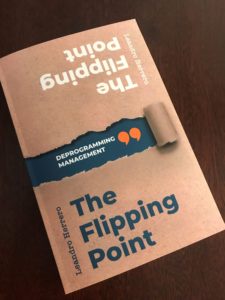And the question is: ‘Why are you still here?’ You learn about the organization by asking questions to employees when they leave you (exit interviews) but you learn far more when you ask them why they are staying (‘stay’ interviews). It’s not a joke. ‘Why are you still here?’ – with the emphasis on the word still – it’s the best Employee Engagement survey you can have. It’s also very cheap and you don’t need an external agency.
It’s the only question that allows the person to respond with something like ‘I need to pay my mortgage’ (I have never seen an Employee Engagement survey with this kind of answer). Also, possibly, ‘It’s the best place I could dream to work in’, and anything in between. We are so afraid of direct questions that we tend to ask people things in complicated ways. I have practiced this with clients many times and I have always got the richest of answers. Believe me, a one-question questionnaire is a dream.
________________________________________________________________________________________________
More thoughts on Employee Engagement
Extract taken from my new book The Flipping Point. A flipping point in the trend for adopting absurd management ideas needs to be reached. The Flipping Point contains 200 short vignettes exploring what ’deprogramming management’ may look like. Read recent reviews here.
The industry of Employee Engagement (and there is a big one) says that companies with high employee engagement (as measured by some kind of artificial tool) are more successful. And produces ‘studies’ to prove it. Employee engagement is clearly portrayed as the reason for success, so the path is clear: how can we get more of it? My view is that success creates employee engagement, not the other way around. If you want high employee engagement, run a successful organization. I know it’s rather inconvenient to think this way.
The industry of Employee Engagement says that companies with high employee engagement are more successful (…) My view is that success creates employee engagement, not the other way around. The book The Halo Effect (2014) by Phil Rosenzweig opened my eyes to this. I would put this book in the list of obligatory reading to anybody in management. The subtitle of the book is explicit: ‘and the Eight Other Business Delusions That Deceive Managers’. Rosenzweig quotes the case of the UK retailer Marks and Spencer, a company which at some point scored at the top in employee engagement rankings. Then a terrible year in business performance came up and employee engagement scores went down significantly. Not a single iota in benefits, programmes, employee care, or anything had changed. Just abysmal market performance.
If you have enjoyed The Flipping Point – Deprogramming Management, I’d be delighted if you could leave a review on Amazon. Many thanks to those of you who have taken the time to do so.
If you’re yet to get your hands on a copy, then you can buy here.




Would you like to comment?